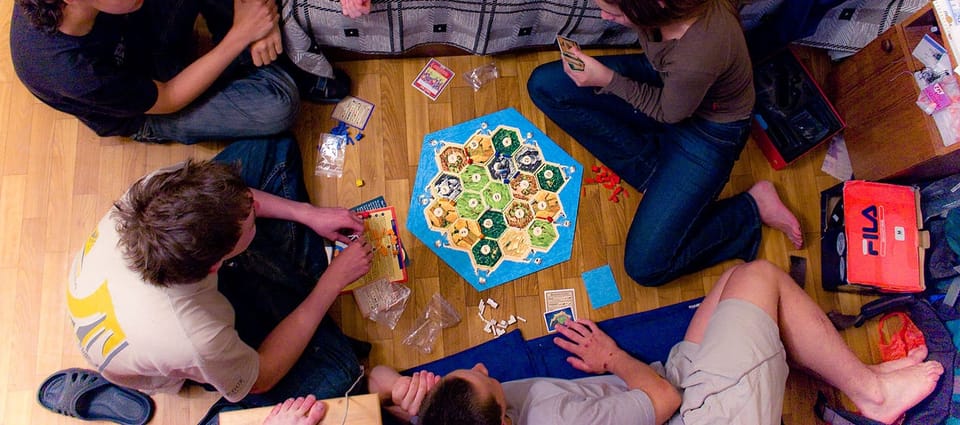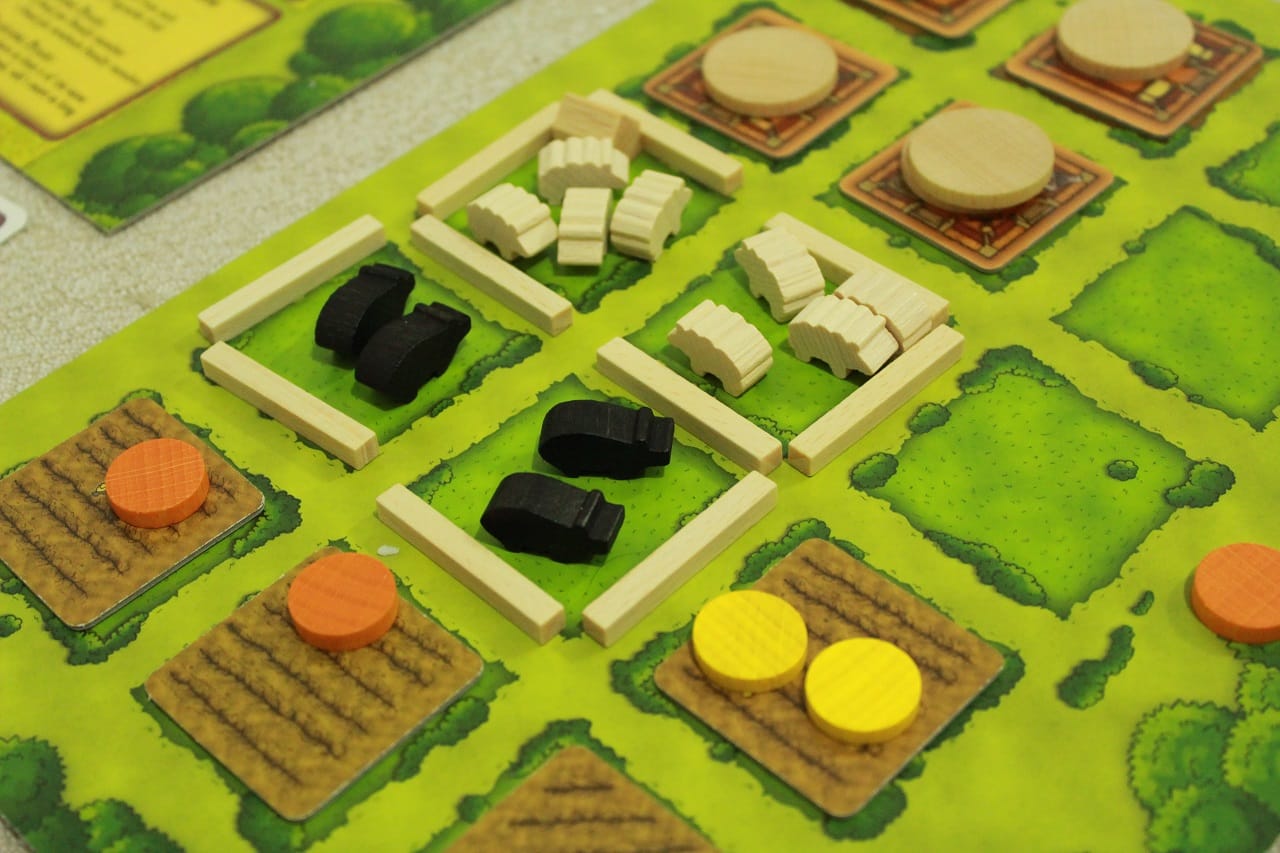An intro to tabletop gaming as ritual

Every time I unbox a board game it feels as though I’m ‘starting something’. There’s a secure rhythm in drawing out components, shuffling decks, placing pieces; it feels significant in the same way that the placement and positioning of elements in communion or offering feels holy. Mats are laid out, figurines placed, tokens piled according to kind. Victor Turner wrote the following in “Symbols in African Ritual” in 1973:
“A ritual is a stereotyped sequence of activities involving gestures, words, and objects, performed in a sequestered place, and designed to influence preternatural entities or forces on behalf of the actors’ goals and interests.”
Society is comprised of a number of closed loops: regular business hours, reliable services like money withdrawal or ticketing, religious liturgy. Banks and donut stands alike thrive on predictability. So do churches, news sites, nurseries, universities, Tumblrs, and bike shops. Much like train schedules and the Eucharist, each board game is a kind of closed circuit, a mechanism designed to operate by certain rules to produce a specific experience.
Embedded in these rituals of play are distinct cultural events
When I splay out the monstrosity that is Eldritch Horror (2013) on my grandparents’ dining room table, I raid the cupboards for small bowls in which I place travel tickets, brain-shaped sanity tokens, monster tiles, clue tokens. After the other players are gathered, I gesture to progress tracks and parts of the board state, explaining the mechanics we need to know to start playing. “We’re fighting an ancient evil,” I say, “and we have to work together if we want to stop it.” The ritual we’re undertaking, playing this game, is purely in service of the preternatural forces of fun, friendship, and intellectual exercise. And also in service to defeating Cthullu.
“Board games are engines to create memories with people,” said Quintin Smith, of the tabletop games blog Shut Up & Sit Down, in an interview at the 2015 Fantasy Flight Worlds Championship. Each unique system is meant to simulate or reflect social moments, such as shared survival, trust, rivalry. Embedded in these rituals of play are distinct cultural events: processes of incorporation, of cleansing, of invoking higher powers for gain in certain spheres. And so it is that we can categorize various styles of board game experiences according to their ritual parallels, such as the five below.

Rite of Passage
There’s an element of becoming involved in any gaming experience. In Agricola (2007), we become farmers; in Catan (1995), settlers; and in Ticket To Ride (2004), bored plutocrats. In hidden identity games, though, the lifeblood of the game is wound up in creating a society and tasking a few players to sabotage that society. These are games in which trust is currency. The Resistance (2009), Shadows Over Camelot (2005), and any variation on the Werewolf (1986) and Mafia (1981) genre (i.e. last year’s Mafia de Cuba) involve setting up a complex ecosystem in which players must lie or stretch the truth to some degree to survive. These games are about separation from a society, and subsequent incorporation into that society. Successfully incorporating oneself into “the group” is the goal, regardless of whether or not a player is “one of them”: it’s about the ritual of becoming, not actually being. Much like Confirmation for Catholics, a Bar/bat Mitzvah in Judaism, or the Walkabout in Aboriginal Australian society, the point is to become part of the whole.
The mechanics in the hidden identity game are social, not technical: verbal battery and interrogation, group assessment, and eventual incorporation or estrangement depending on whether or not the subject meets the group’s standards. In Avalon (2012) and this year’s Secret Hitler, votes are cast to determine whether or not the group trusts the individuals. Players win or lose based on how well they can be trusted and how well they judge their fellow players—or if their faction’s compatriots hold sway. Regardless of whether or not friendships have been shattered, the illusion of this new society (and one’s place in it) is shattered when the game ends.
Ritual of Purification
There are a variety of games designed to play out like unfolding crises. These are cooperative in nature, or at least heavily collaborative, and include the likes of 2008’s Pandemic (curing disease), 2008’s Ghost Stories (exorcising ghosts), or 2010’s Forbidden Island (keeping an island afloat). Every mechanic works to up the tension like a self-winding trap as players work to mitigate the crisis and prepare for new disasters. Board games of this nature are mostly mechanical puzzles, and require players to think together. Others, like Descent (2005) and The Fury of Dracula (1987), pit a group of players cooperatively against one player in asymmetrical play.
A wasted round can end a game prematurely
Typically, a rite of purification needs a shaman or spiritual leader. And regardless of how egalitarian a group of players may be, a similar dynamic often emerges during gameplay. The most experienced player often guides other players’ hands to make “best decisions” in a game like Arkham Horror (2005) in which play itself feels like a constantly losing battle. A wasted round can end a game prematurely, and direction is often sorely needed. Like its cultural counterpart, this kind of game can end abruptly with nothing to show for it save its psychological drain.
Rites of Political Power
Gluckman’s conflict-focused study of political anthropology is at the core of many politically-themed board games. The tensions of navigating a claustrophobic board space with other players are fuel for Risk (1959), Chess (1475), and Small World (2009). These tabletop games can solidify one person as “chief” of one’s social circle, prompting favors (ie. “Losers buy winner ramen,” etc.) but, unlike the shaman in more cooperative games, everyone wants to be the chief. Through direct competition—with less cooperation, and maybe with a little luck—the chief establishes herself.
However, as in Geertz’s observations of the traditional Balinese state, power in these games lies in how one is perceived. The most powerful player may have nothing other than an image. Still, how the group reacts to their perception of that player can put someone else ahead. This is particularly salient in a game like Cosmic Encounter (2008), in which a simple over or underestimation can hand a player the win. And in the heady A Game of Thrones: The Board Game (2003) which runs off of player suspicions, misplaced trust can cost a player dearly.

Rituals of Harvest and Bounty
Some rituals are about invoking powers for greater fortune or bounty—and these might fit roughly under shamanic purification (solving a spiritual problem). However, people gather during harvest rituals such as Thanksgiving to celebrate abundance, not simply to ask for it. The same is true of many Euro-games like Agricola or Settlers of Catan, or even economic simulators like Machi Koro (2012): the ecosystem of the game is designed to feed the players, who harvest and feed back into the game as they build their own economy. Competition here is often passive, and there’s a sense that “you get out what you put in” along with a bit of luck. The “offering” players make at the end of these games is the sum of what they have earned; the payoff is victory.
Commemorative or Calendrical Rituals
According to my friend Amangul, Kazakhs and Turkish people feast for three days on Nowruz to celebrate an ancient Persian massacre. On Columbus Day, we commemorate a man who exploited the Americas. These holidays are embedded rituals that serve to keep significant bits of history relevant, even if we mostly use them to overeat or buy extravagantly. Tabletop games like Twilight Struggle (2005) and Memoir ‘44 (2004) commemorate the paranoia of the Cold War and the furor of the D-Day Landing, respectively. Though, they’re mostly an excuse to gather two or more people around the dining room table to wage complex tactical and psychological warfare.
The celebrated events don’t even have to be real. The upcoming Star Wars: Rebellion is a tactical war game that invites players to reimagine moments and events from the films, often in unique ways. When one examines the potency of role-playing a part, either as an unsympathetic villain or inscrutable hero, the ritual of play becomes more an exercise in empathy, inviting players to experience moments they never would otherwise.
Header image: Valentin Gorbunov via Wikimedia Commons



